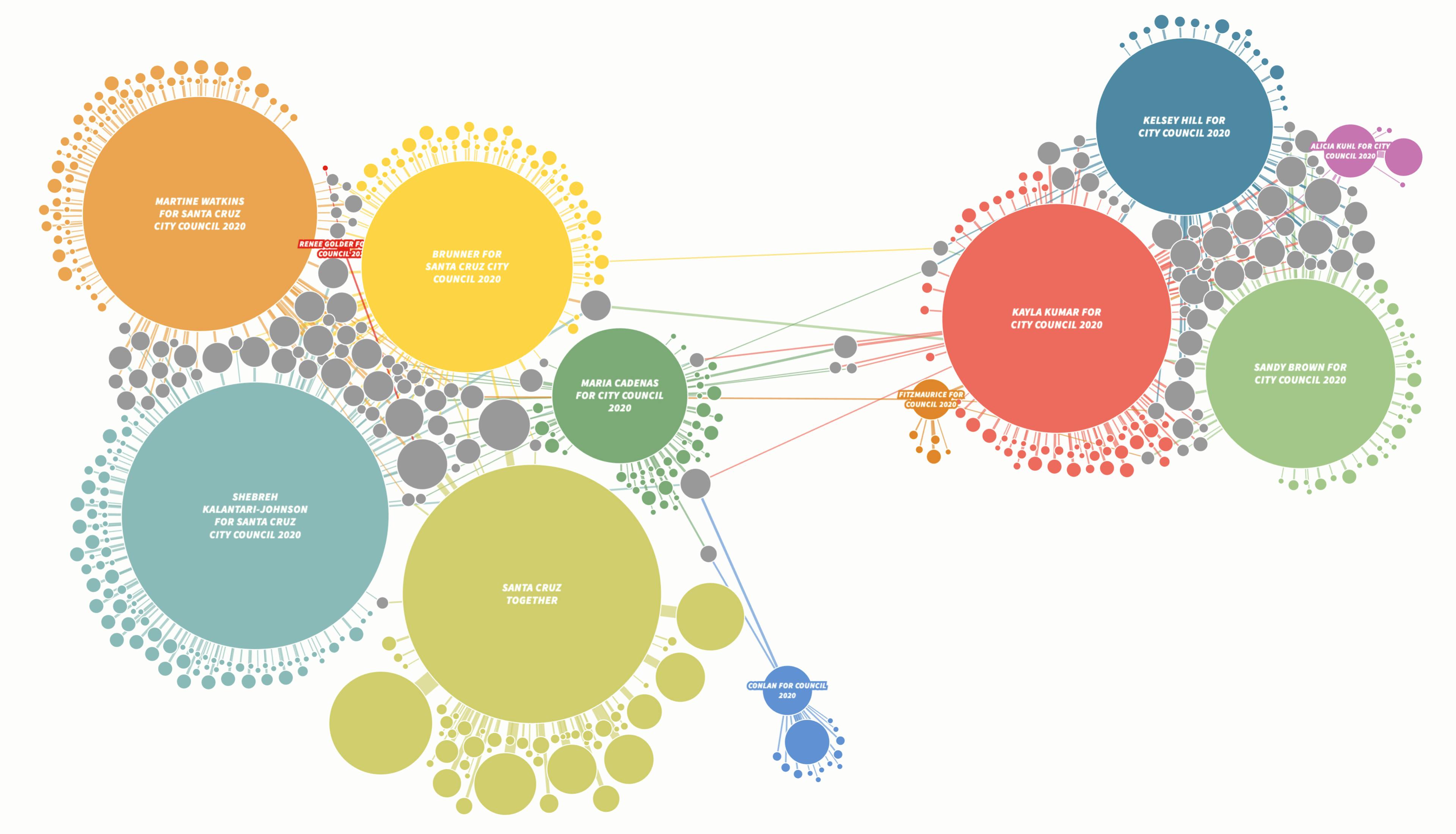
Follow the Campaign Cash Flows
The MONEY Problem
It's obvious that there is a great deal of money being spent nationally, state-wide, and locally in order to fashion particular political outcomes. In the closely-watched US Senate race in South Carolina, everybody's darling, Jaime Harrison, is close in polling to Lindsey Graham, or everybody's Simon Legree, the principal villain in Harriet Beecher Stowe's antislavery novel Uncle Tom's Cabin. Harrison has raised a mind-numbing $87 million to unseat this rather repugnant, self-deceiving and nation-deceiving incumbent. Harrison's run is a righteous cause, but the amount of money involved is scandalous. To make matters worse and perhaps justify the money war, Republican troglodyte Graham said last year he would never take a vote on any Supreme Court nominee this close to a Presidential election. Well, it happened. As chair of the senate judiciary committee overseeing the nomination of conservative zealot Amy Coney Barrett he helped speed up the process for her to replace Ruth Bader Ginsberg. The final vote took place one week before the general election. Graham is now not only a Trump suck-up, but a money pit: he's gone so far as to politically shave his butt and is currently walking it backwards into a wind turbine of Democrat cash blowing right across this sitting Senator's 2020 hopes of keeping South Carolinians shackled to a future without healthcare for all.
Everything is coming down to the corporate-backed, take-no-prisoners lobbying effort in the Supreme Court's 2010 Citizens United v. FEC decision that effectively makes cash into free speech. The money raised by South Carolina's Harrison is but one example of how even good people can get caught up in the bad politics of raising money to pummel your opponent. My own experience with campaign fundraising is that many who put money on Harrison did so to actually curry influence and receive favors after he's elected. But make no mistake, Jamie Harrison is the best candidate running for Senate in South Carolina to beat Lindsey Graham.
The political money cesspool is currently wide and deep here in the Golden State too. Proposition 22, the Uber, Lyft, Instacart, DoorDash-funded initiative, is now the most expensive proposition campaign in state history. Already more than $200 million has been raised (with more on the way) as the sprint to November 3rd is underway. This money is a gargantuan Las Vegas-style bet, mostly by the "ride-share" industry–and with the odds in their favor. The gig-economy financial titans seek to overturn Assembly Bill 5, which was signed into law by Governor Gavin Newsom last year. It calls for these same companies to make drivers official employees, instead of independent contractors. Without being an "employee" there is no chance of unemployment insurance, disability care if injured on the job, or health insurance being paid by these corporations.
It’s the latest battle between those who believe in the pure capitalist rhetoric of “we are all free agents” versus others who demand that workers have rights and ought to be able to collectively bargain , as the owners, Uber and Lyft, seek to buy a new law to benefit themselves. Uber argues that workers just want more flexibility and should be “free” to be essentially independent agents, but current law does not prohibit these large corporations from paying fair wages and offering flexible hours, and that will remain the case even if Prop. 22 is defeated.
Can Big Money Buy the Santa Cruz City Council?
Now, keep in mind that when companies, corporations, and individuals acting on behalf of realtors and developers contribute to city council campaigns, they usually want something. They generally wish to see fewer obstacles in their way in maximizing their present and future investments in Surf City. Of course, many locals contribute to city council campaigns because they hope for an overall change in government policies, or a continuation of the status quo. Voluntary campaign spending limits already exist here (but they are voluntary) and considerably level the playing field when compared to unlimited donations going into state initiative campaigns, but we could still do better locally. Currently, if a city council candidate accepts the voluntary limit, he or she can spend no more than $40,000 in promoting themselves for political office. Individual donations, on the other hand, have a mandatory cap of $400 per person or corporation.
Periodic statements, or “460s”, are required to be submitted at times during the campaign to show where a candidate's money originates. Are there bundles of donations from certain sectors like real estate interests, for-profit housing developers, or labor unions? If so, that would indicate which interest group a candidate might end up beholden to. Again, if you accept the $40k overall limit, one would think this might not be enough to buy a councilmember's vote, but my experience is that it certainly opens doors at city hall and creates a subtle you-owe-me attitude, among certain donors. I would argue that some economic players—local and out-of-towners--donate with the expectation of influencing local zoning, taxing, and property initiatives, which any particular city council might take up. Some even donate to all political sides to be safe, but that is not happening in the current council race in which there are two clear slates running: the haves vs. the have-nots. Such a campaign is rarely seen here because it's usually haves vs. haves.

Image generated from monetary contributions made and reported before 10/31/2020 this year in the City of Santa Cruz. Each unlabeled dot is a donor. Each link is the total sum of donations to a committee. Gray dots indicate that a donor has given to multiple committees.
For example, in 2018 Santa Cruz witnessed perhaps the biggest money coming to town in the form of the CAA, the California Apartment Association's shameless behavior in leading a $1.2 million campaign to defeat the rent control initiative known as Measure M. They had enough left over (and raised even more) to spend lavishly in the following election’s recall campaign of two city councilmembers, subsequently installing their fourth vote, out of seven, onto the City Council this past March.
Big money did in fact buy the council–mostly because there were no spending limits in the rent control campaign. Many tens of thousands were spent to put the recalls on the ballot, and several tens of thousands more to eek out a slim majority. Much of the largesse spent on stopping rent control and enacting a recall came flowing in from outside of Santa Cruz. And guess what? These same interests are doubling down in the 2020 city council elections. Recent candidate campaign donations and expenditures can be found here for the candidates, last updated 10.31.2020:
- Sonja Brunner - $28,121 raised
- Sandy Brown - $21,980 raised
- Kayla Kumar - $32,095 raised
- Kelsey Hill - $20,744 raised
- Shebreh Kalantari-Johnson - $35,948 raised
Including $400 from the California Real Estate PAC - Martine Watkins - $30,924 raised
Including $400 from the California Real Estate PAC - Maria Cadenas - $13,633 raised
- Elizabeth Conlan - $2,949 raised
- Alicia Kuhl - $3,296 raised
On the City Council MONEY Trail
Developer and real estate interests are funding at least three local candidates in the lead up to the November 3rd election and it is clear that real estate interests are trying to buy another city council. The overwhelming amount of money put up by the real estate industry and certain individual realtors for three candidates, is now clear and can be seen in the above campaign financial statements but also in their political action committee (PAC), Santa Cruz Together (SCT), as well. There are three candidates that the realtors are seeking to influence city politics, as was seen during the rent control and recall campaigns. It's not just speculation on my part about which horses the realtors’ money is backing, but the three candidates even trumpet on all their mailings and web sites the support of SCT, a PAC.
It is no surprise that developer and real estate interests are NOT supporting Sandy Brown, Kayla Kumar, or Kelsey Hill, but labor unions and local political groups are all in. The donations are lopsided indeed, with hundreds of dollars coming from each labor group, SC4Bernie, and the People's Democratic Club, but thousands are heading into SCT's coffers. Labor's efforts are dwarfed by the large donations Santa Cruz Together, and the candidates themselves, have received from real estate interests. These entities, some hiding behind Limited Liability Corporations (LLC), are investing money into candidates and they will expect a return. Remember, while many of these folks have maxed out the $400 individual limit per candidate, there are no limits on what they can donate to the Santa Cruz Together PAC, and donate they do. From SCT's 460 form it looks like "total expenditures made" was $78,108 this calendar year. Here is a list of what just a few of these donors (not to mention, but not listed here, are donors from San Jose, Oregon, San Mateo, and San Francisco) have given this year as of 10/22/20:
- Ken Carlson, realtor, $2,250
- Karon Properties, real estate, Santa Cruz, $7,500
- Peter Cook, Lighthouse Realty, $2,500.
- Richard Moe of Soquel, developer and realtor, $4,000
- Hallie Richmond, Property Manager, Santa Cruz, $3.500
- Robert Williams at 134 McCormick St. is a property manager, $1,500
- Hallie Richmond, real estate agent, Live Oak, donated $2,501 on Sept. 23, 2020.
- Kenneth Rilling property owner of Prundale, $800.
- Alan Ramadan, of Scotts Valley, who brings together "entrepreneurship and venture capital," $2,500.
- Doug Ley of Redtree Properties (His Front Street properties are up for city permitting) $1,000.
Reforming Campaign Spending
Can socialists reform the way campaign spending is done–or is defunding the whole damn system called for, similar to non-reformist approaches to the police? In Santa Cruz, what is clear is that voluntary spending limits clearly help stave off a run-away big money game at the city council and county supervisor levels. Further incentives such as public campaign financing would help candidates of lesser means and it could be incentive based. According to this scenario, every $5,000 raised by a candidate would be matched by city money up to the current limit of $40,000. Candidates in Santa Cruz can currently not accept the limit and spend much more freely. One candidate in 2018 agreed to the limit and then spent over $60,000 and was hit with a fine. Where we need much stricter limits is municipal ballot measures. Begin with voluntary limits and generous matching public funding in order to stay competitive with the outside money certain ballot measures attract, like rent control and hotel tax initiatives. Until Citizens United is overturned the only way to bring down spending is with publicly financed incentives.
A More Socialist Santa Cruz
The comparison with "defunding the police" only holds if we move to defund the corporate real estate and developer cash from local campaigns. For example, in June of 2018 Goldman Sachs bought the 168-unit Outlook Apartments (now Hilltop) on Western Drive for an eye-popping $55 million. A Menlo Park company bought the 104-unit Oceanview Apartments at Columbia and Pelton for $40.68 million in 2017. Clearly, since the capital is not local, the solution is likely tied to state and national political reform.
What could a People's Republic of Santa Cruz, or at least an actually democratized one, do on its own? Besides instituting more generous campaign finance measures to widen the field of those who wish to run for public office, a system of Ranked-choice Voting, might also be implemented. It makes elections fairer and cheaper by giving people the opportunity to vote for their values, without losing the opportunity to also vote strategically. We also can not pretend that we pay officeholders once they are elected. Right now, councilmembers receive about $1,500 per month, which is hardly a living wage, while county supervisors receive well of $100,000 per year, more than a living wage.
We can continue to pursue rent control, but this time perhaps direct rent control toward people who own four or more properties, which gets it away from a large and vocal opposition, usually of local small-scale landlords, who feel like rent control would threaten their retirement savings. We must also not give up on taxing those rent-controlled properties in order to support an elected rent board. An elected rent board is the key to permanent and secure rent regulation and it would also help level the playing field between landlords and renters. In addition, we might move more aggressively in negotiating with UC Santa Cruz to bring on-campus housing prices (rent!) down to affordable levels. Campus prices are driving the local housing market and as long as that continues, rental prices will stay sky-high.
A socialist city council would do well to reach out to voters and place more initiatives on the ballot. Do we want parts of Pacific Avenue closed permanently to car traffic? Should we have an elected public auditor to offer an unbiased perspective on city finances? Would you like to see the city do everything within its existing power to limit the growth of UCSC to 20,000 students? Do you support free and all-electric public transportation? Isn't it time for curbside composting in the city of Santa Cruz? Addressing these questions in the positive may soon be within reach. With so many high profile DSA members—from Bernie Sanders and Alexandria Ocasio-Cortez to Cori Bush and Jamaal Bowman—getting elected and developing national organizations to help local elected officials, it's an exciting time to be, or become, a socialist. With the DSA membership continuing to grow in our city, a socialist Santa Cruz may be on the horizon.
Update from the editors: The candidate totals have been updated to reflect reported totals, not calculated totals from reported individual contributions–these calculations left out the "unitemized monetary contributions of less than $100" which make up thousands of dollars in nearly every City Council campaign.
